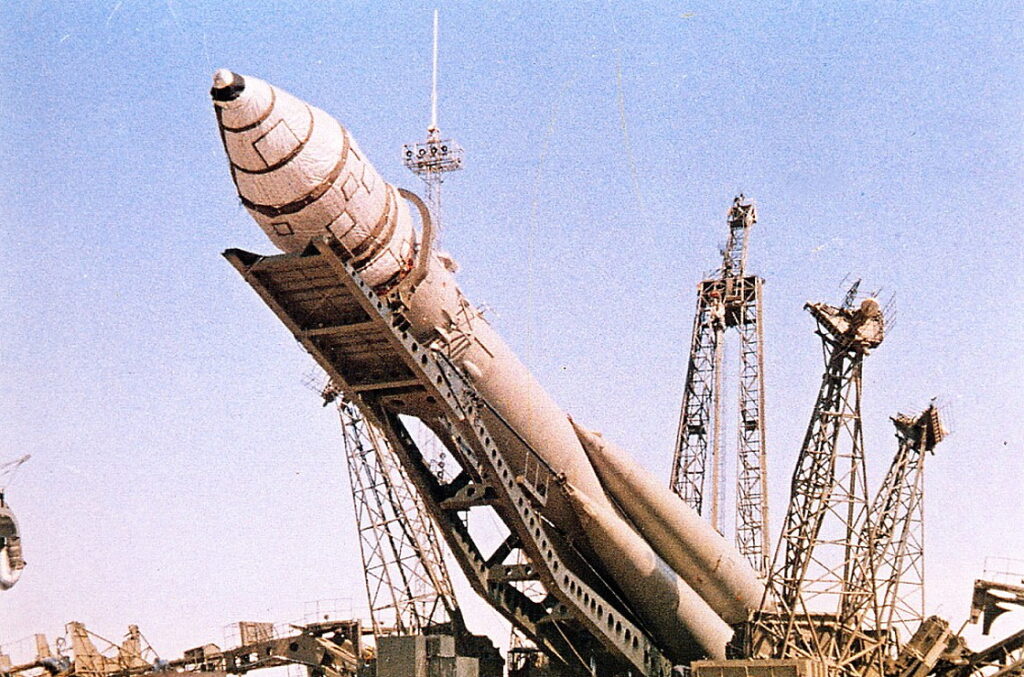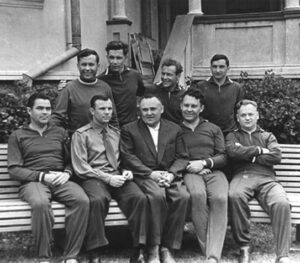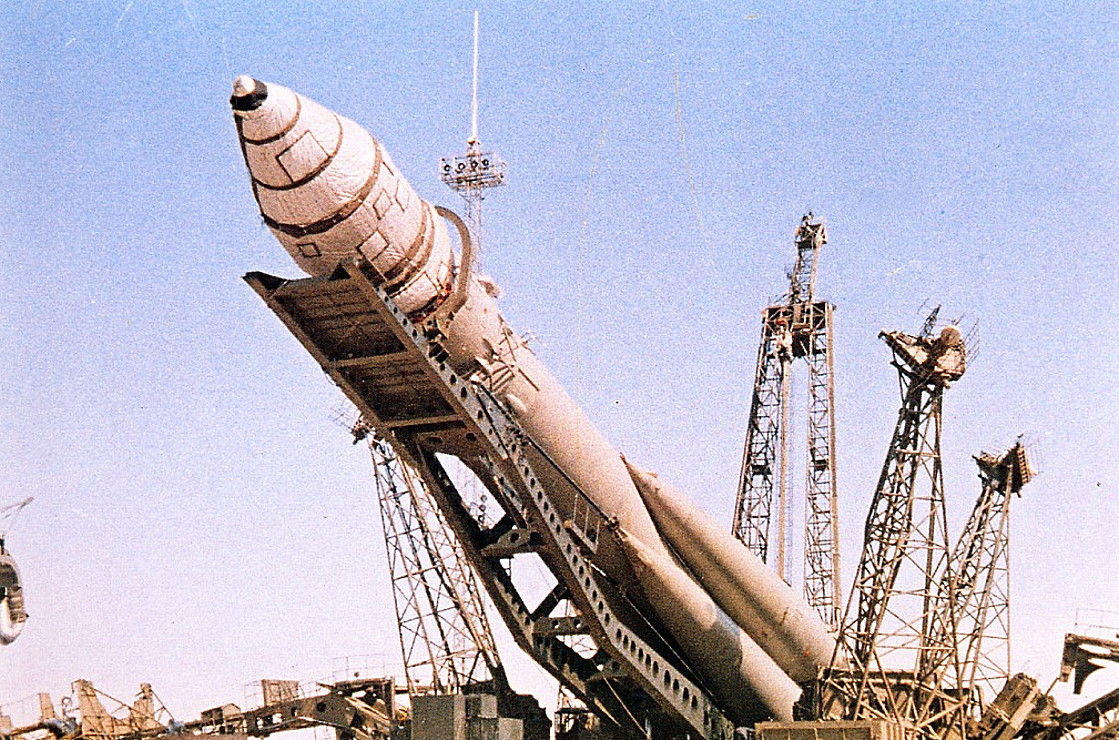
A still from 1961, when the Cold War had moved beyond tactical warfare—national identities were at stake. Fierce competition between the US and USSR had taken the War to space. At the Baikonur Cosmodrome, (in present-day Kazakhstan), a group of ambitious scientists and aviators set out to create history and achieve what had been dreamt of for a long time by most people. Here’s what might have transpired during those days through the eyes of two exceptional individuals.
The Engineer:
It had been 16 years since the war ended. At the time of the draft, I was only 18 years of age. Fresh out of school, I had no clue what I wanted to do with my life. So, like any young man at the time, I joined the war effort. Years and years of fighting had robbed me of my youth. The War gave me a sense of purpose and import. I always had something significant to do, or at least I thought I did. After the victory, that purpose had vanished, just like the last remnants of Axis rule over Europe. I was limping back to normalcy, both literally and figuratively (I was injured in the War). I always had a flair for physics, however. Solving problems was natural to me. This passion for science took me to a military research centre, where I met Comrade Sergei Korolev. Comrade Korolev and I had formed a great working relationship, and I followed him to Star City, the closed town in the Moscow Province where all of the Soviet Union’s wonderful plans for space domination were realised.
Weeks Left to the Launch—March 1961
The Engineer:
With only two weeks left for the launch, the atmosphere at the Baikonur Cosmodrome was frantic. The launch had to be perfect. The pride of the Soviet Union was at stake. Under no circumstances could we have let the Americans continue to have the upper hand. Comrade Korolev was a brilliant chief designer, no doubt, but he has a history of being fiercely competitive. He advanced the launch of Sputnik 1 to October 4th, 1957 just so that we could edge the Americans out by a day or two. Frankly, I never understood this competition. To me, space was always this mysterious realm, waiting to be explored. To Moscow, it was just another battlefront to annihilate the enemy from. However, my allegiance, in War and Peace, was to the Union and so I worked for it.
The crew was yet to be selected. Star City, where the Soviet space agency was headquartered, had put together a squadron of six talented pilots called the Vanguard Six. A few members had to be sent back since they were deemed unfit—more capable pilots later replaced them. Out of the six, Yuri Gagarin stood out. From what I hear, Yuri is a promising individual, amicable, and extremely intelligent. However, we believe weightlessness could do unimaginable things to the best of minds. And so, as a precaution, the manoeuvring of the spacecraft could only be controlled by us. A secret code could be used to override the automatic controls, and Yuri (or whoever is chosen to fly) could use it to fly the craft himself.
Yuri:
It’s been six months since Belka and Strelka, two dogs we sent to space, returned to our planet safely in the Korabl-Sputnik 2; the first spacecraft to have been sent into the orbit carrying two dogs, 40 mice, two rats, and 15 flasks of fruit flies and plants! What a tremendous success for us! I wonder why people in the West incorrectly refer to it as the ‘Sputnik 5’. Anyway. The USA tried mirroring our feat two months later, but three mice? Ha! It’s hard for me to fathom how they think they are going to win this race. The Space Race. Which reminds me, I need to get ready for my meeting with the Vanguard Six and Sergei Kolorov, our fine Chief Designer. We, at the Soviet Space Program, are lucky to have him. Today, it’ll be determined if I’ll be the one to be launched into space. I imagine if I could become the first human to orbit Earth. And return. Alive. At the moment, I should focus on making it in time for the briefing.

Launch Day—11th–12th April 1961
The Engineer:
It was finally the 12th of April, 1961. Launch day. If this goes well, I am reasonably confident that the re-entry and landing manoeuvres will, too. The odds, however, were split. Half of the launches we had carried out before this had failed. None of us had any certainty of the success of the launch, not even Comrade Korolev. The only thing that drove us today was hope. I couldn’t sleep the night before.
Today, the excitement and fear of the launch kept me on edge. At 4:00 AM in the morning, I reached the cosmodrome. Yuri was woken up at 5:30. After a team assisted him into his suit, we were ready to move to the launch pad. The journey from the cosmodrome to the launch-pad would’ve been a mere 15 minutes, but today, every minute felt like an hour.
In the middle of our journey, he requests the driver to stop the bus. He needs to answer the call of nature. After he returns, Comrade Korolev, Yuri, and I make our way to the 95 metre-tall Vostok launcher. The 50% success rate of our missions weighed down on all of us. Yuri tries to lighten the mood with a couple of jokes, but all we can do is smirk knowingly.
We open the hatch of the spacecraft and let Yuri in. This was it! In a matter of a few hours, this 2.5 metre-wide spacecraft (and the man inside it), were going to make history. I close the hatch, only to realise that the seal isn’t complete. We’ve been set back by an hour. We spend an hour trying to unscrew the hatch, while Yuri sits inside, waiting patiently. After an hour, we close the hatch for good. I tell Yuri the code to override the controls, ‘1-2-5’. I return to the control station where I meet a pale-faced Comrade Korolev. He is silent, resolute, and focussed, just as everyone else in the room. It is 6:05 AM UTC; we are two minutes from launch.
In the blink of an eye, I hear Korolev’s countdown, “Ten, Nine, Eight, Seven, Six, Five,…”. “Preliminary stage… intermediate… main… LIFT-OFF! We wish you a good flight. Everything is alright!”
“Poyekhali! (Let’s go!)”, says Yuri in response, and the launcher lifts off.
Yuri:
On the way to the launch-pad, I ask the driver to stop the bus to take a leak. I’m a practical man.
At the launch-pad, a doctor walks towards me and gives me a tight, assuring hug. I hear her say “Yuri, everything will be fine.” I nod. I assume everybody around me considers my quietness as an indicator of worry. It’s not that I’m nervous, it’s just that it isn’t an ordinary day. The entire country is counting on me.
Knowing there’s a 50% chance of catastrophic failure, I enter the spherical descent capsule. Woah, this is really happening. Okay, maybe I’m a little nervous. I could use some music right now. I request music to be played over the radio. No, this isn’t helping. Instead, I have chest pains. They are quick to bring me a pill to get me out of this state of dysphoria.
I feel much better. A medic checks my pulse. The machine reads ’64 bpm’. See, I knew I wasn’t nervous!
I hear Sergei’s voice through the radio, “Preliminary stage…..intermediate….main…..lift off!”
“Poyekhali!”, I respond.

The Journey—12th April 1961
Yuri:
Ten minutes have passed since I departed from the Baikonur Cosmodrome, and I sense the rocket separating from my capsule. I report, “The craft is operating normally. I can see Earth in the viewport of the spacecraft. Everything is proceeding as planned.”
Three minutes later, at 06:21 UT, as I pass over the North Pacific Ocean, I radio, “I’m feeling fine, and I’m in good spirits,” and proceed to convey cockpit parameters whilst I watch the sunset and quickly cross into the night side of the Earth.
I repeatedly warrant my safety at regular intervals but receive no data on the flight from ground control for about 25 minutes.
It’s been 10 minutes, and by the looks of it, I don’t think they are receiving any of my spacecraft status messages at all.
The Engineer:
The launcher ripped through the Earth’s atmosphere, and the detachment of the capsule had begun. It has been ten minutes since lift-off. We ask Yuri whether the process has completed and are met with a reply in the affirmative. A short wave of joy and excitement sweeps the control room. We monitor flight statistics like altitude and the orbit route for the next twenty minutes until we realise that the communication module has malfunctioned. Yuri might be sending us status reports, but we are in the blind. This isn’t of concern since the capsule orbits as expected. We wait for the descent to begin.
Descent—12th April 1961
Yuri:
It’s 07:25 UT, and since I wasn’t given control of the spacecraft, the automatic systems are bringing it into the required altitude for the retrorocket firing. The next few minutes are going to determine my country’s position in the Cold War and the rest of my life.
The service module isn’t detaching itself from the craft. As I re-enter, my spacecraft undergoes intense gyrations, but I don’t want to make noise and startle my team. The gyrations won’t endanger the mission, I reckon. I am conscious despite the extreme g-force acting on my body.
It’s been half an hour, and I sense the hatch releasing now. Finally. I eject along with the parachute, and it opens almost immediately.
In another 10 minutes, I land. I realise I’m in the Saratov region of Russia. A farmer and his daughter watch me, evidently alarmed. I reckon I’d have been too if I saw a man in a spacesuit dragging a parachute along with him in the middle of nowhere. I walk to them as they walk away from me and say, “Don’t be afraid. I am a Soviet citizen like you, who has descended from space and I must find a telephone to call Moscow!”
After Landing
Yuri:
I’m being told that an announcement about the mission was made during my time in orbit which is very unlikely for the USSR to do. A plethora of reactions from across the World is pouring in. The USA congratulates us on the front but in reality, have mixed feelings about the news. The prime minister of India, Jawaharlal Nehru, is praising the Soviet Union for “a great victory of man over the forces of nature” and is urging that it be “considered as a victory for peace.”
My superiors ask me to keep mum about the “little” detail regarding my landing conditions. The World didn’t need to know about the glitches that ensued while landing. I have a lot of interviews ahead of me, but for now, I just want to take a moment to let it all sink in. I did it!
I am humanity’s first representative to be sent into space!
Written and edited by Avaneesh Jai Damaraju for MTTN and Sysha Sharma and Prabhat Namdharani for Blank 101
Image Courtesy: NASA, ESA, Advantour.com

Leave a Reply
You must be logged in to post a comment.